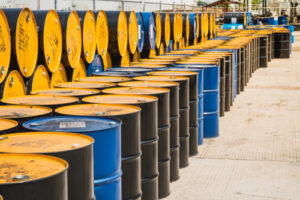The High Stakes of EU Sanctions on Russian Oil: A Closer Look

As the geopolitical landscape continues to evolve, the European Union has rolled out its 17th round of sanctions against Russia—a move increasingly viewed as necessary yet fraught with consequences. Jean-Noël Barrot, France’s Minister for Europe and Foreign Affairs, has taken a bold stance, proposing a staggering 500% tariff on Russian oil purchases. But will such sweeping measures serve their intended purpose, or will they exacerbate existing challenges within Europe?
Sanction Fatigue: Are We Going in Circles?
The persistent call for harsher sanctions raises a crucial question: have the previous 16 rounds been effective? Barrot asserts that the current measures have failed to deter Vladimir Putin’s aggressive military actions. The notion of "strangling" the Russian economy is a tempting one; however, the complexities of global energy supply chains mean that such an approach could backfire.
One critical aspect often overlooked in these discussions is the disproportional impact on EU nations themselves. For instance, Hungary relies on Russia for approximately 60% of its oil, primarily imported through the closely-linked Druzhba pipeline. Similarly, Slovakia’s dependence on Russian oil is as high as 80%. Prime Minister Robert Fico has voiced concerns about the economic ramifications, describing the move to cease imports as "economic suicide."
Striking a Balance: Individual Nations at Risk
The EU’s unilateral sanctions approach may come from a well-meaning place but fails to consider the unique circumstances of its member states. Countries like Hungary and Slovakia are left grappling with infrastructure designed around Russian energy, increasing their potential operational costs and vulnerabilities. Switching energy suppliers is not just a matter of finding an alternative source; it involves a monumental overhaul of existing systems, incurring higher transit fees and overall energy costs.
Fico’s recent visit to the Kremlin underscored Slovakia’s desire for a more pragmatic approach to its energy needs. He articulated the instability that halting gas and oil imports could create, urging for a constructive dialogue rather than blanket sanctions that end up hurting EU economies more than intended.
Evolving Dynamics and Future Implications
The EU’s implementation of sanctions, especially without unanimous agreement from member states, raises questions about its internal democracy. The erosion of democratic processes, where decisions are made with overwhelming authority from Brussels, creates friction among nations that may not share the same economic realities.
Hungarian Prime Minister Viktor Orban has noted that the current sanctions have cost Hungary around €19 billion in just three years—an amount surpassing the country’s annual tax revenues. This brings to light a critical issue: who bears the cost of these sanctions, and at what point do they become untenable for individual countries?
Additionally, while the EU grapples with its energy independence, nations like China and India are stepping in as leading buyers of Russian crude—holding 47% and 38% of total exports, respectively. Russia has continued to find ways to navigate around EU-imposed restrictions, suggesting that sanctions may not yield the desired outcome.
The Road Ahead: Can the EU Navigate This Crisis?
The European Commission plans to phase out Russian oil by 2027, but Hungary and Slovakia have indicated intentions to resist imposed deadlines. The disconnect between Brussels and individual member states hints at deeper fissures in the European project.
At Extreme Investor Network, we believe understanding these dynamics is crucial for informed investment. The EU’s current strategies could set a precedent for economic measures that affect not just energy markets, but investor confidence as well.
The unfolding energy crisis in Europe serves as a reminder of the intricate tapestry of geopolitical relationships and economic dependencies. With sanctions that risk weakening EU solidarity, the pathway forward will be as essential as it is complex. Next time you read about these sanctions, consider not just the immediate consequences, but also the long-term impacts on the European market and global economy. Keep following Extreme Investor Network for the latest updates and expert insights into this unfolding story.

